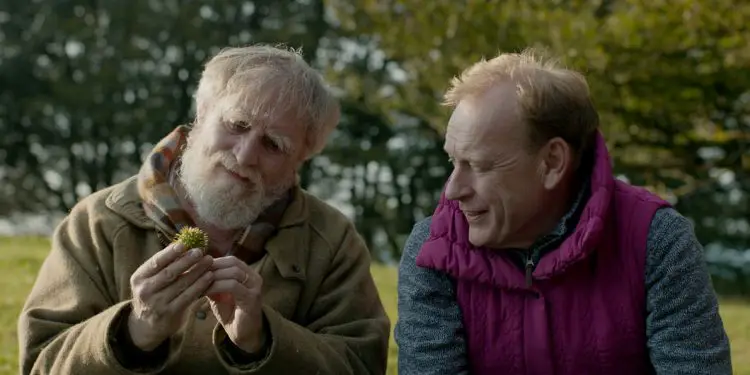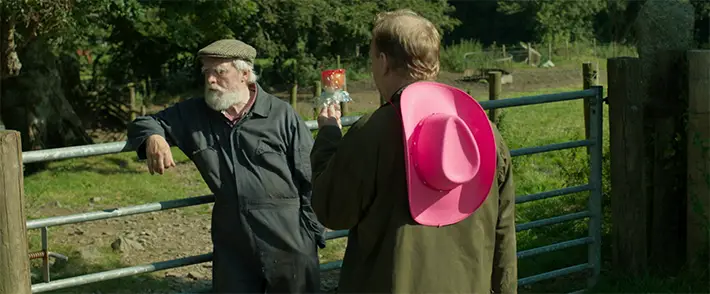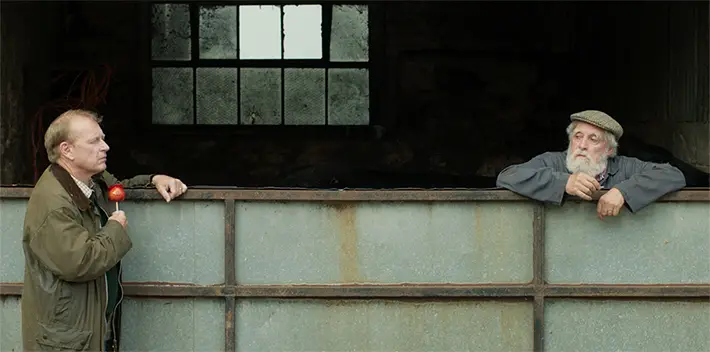And Then Come The Nightjars (2023) – Film Review

Director: Paul Robinson
Cast: Nigel Hastings, David Fielder
Certificate: 15
By Elizabeth Stanforth-Sharpe
And Then Come The Nightjars, a Finite Films production, written by Bea Roberts and directed by Paul Robinson, was originally scripted for theatre, winning the inaugural Theatre 503 Playwrighting Award in 2014, and having its world stage premiere at Theatre 503 in 2015.
When the first case of Foot and Mouth disease for three decades was discovered at an abattoir in Essex, in February 2001, it unleashed consequences that changed the rural landscape and the face of British farming forever. The disease spread quickly, and, unlike the 1967 outbreak, it was not confined to one area; changes in farming methods, and the closure of smaller, local abattoirs meant that livestock were being transported greater distances, increasing the potential for infection to be far-reaching.
The Ministry of Agriculture, Fisheries and Food imposed movement restrictions of animals in and out of eight kilometres around an infected area. It also adopted a policy of ‘contiguous cull’, slaughtering and burning all animals on site, infected or not, found within three kilometres of an infected farm.

“Gentle humour”
And Then Comes The Nightjars explores the stories of two characters caught up in the epizootic; the first, a lone farmer in Dartmouth, reflecting on how the outbreak affected him, the loss that ensued, and how he came to terms with a change in direction; the second, the local vet, whose intention was always to prevent the suffering of animals and now called upon to curtail the lives of healthy ones, jeopardising the trusting relationships built up with farmers over many years, in the process.
The film begins two weeks after the first case of FMD had been detected. Recently widowed Michael (David Fielder) is taking every precaution for it not to reach the land farmed by generations of his family for over 200 years. Disinfectant straw beds are laid at every entrance, gate posts, yard, and animal pens are scrubbed meticulously, and hygiene has become top priority.
Jeff (Nigel Hastings), a friend as well as the area vet, arrives wearing a bizarre hat, in an optimistic mood, confident that he has not encountered any cases, and now that the moorland has been closed and cordons put in place, he’s breezily sure that the disease spread has run its course. He’s there to deliver a calf and, avoiding problems at home, he’s happy to linger. There’s gentle humour and familiarity in their banter as they wait for the new arrival, turning to more serious matters only when Michael hears a Nightjar, a bird with a very distinctive call that appears as night falls, and that has been long associated with imminent death and portents of danger.

“Trauma”
A matter of days later, the cows on the farm neighbouring Michael’s own are found to have FMD, which necessitates his own herd being slaughtered. Jeff, compelled to ensure MAFF regulations are carried out, arrives, wearing the white Tyvek suit of the anonymous slaughter teams, to a heartbroken Michael, who does not understand why healthy animals are to be shot, and that Jeff cannot just tell someone not to do it. Friendship has been replaced by the war on infection. Both men are impotent to stop the inevitable.
Seven months later, the sight of burning pyres, the sounds of gunshot, the stench, and the empty cattle stalls stalk Michael’’s waking and sleeping hours, and his lungs have not recovered the inhalation of smoke. Jeff’s marriage has fallen apart, he is drinking heavily, is on compassionate leave from his practice, and the local farmers want nothing to do with him because of his part in the killing of their beasts. Together, they slowly begin to heal from the trauma.
Eight years later, attending the wedding of Jeff’s daughter, Jeff is divorced and tee-total and Michael is well presented and sociable, but there are still reminders. Michael is panicked by the dry ice from the disco, upset that his neighbour is selling his land for housing development, and finding it hard to come to terms with the fact that he might have to diversify to survive.

“Heart-warmingly tender”
Twelve years after the FMD epizootic, Michael and Jeff are living in the farmhouse, having built up a small herd again, and in the process of converting the barn into holiday lets. Michael is unwell, nearing the end of his life, and concerned that the countryside has become a weekend retreat for tourists who see it only as an ‘oil painting’ with no life in it. There’s a quiet irony that the new housing estate has been named ‘Shepherd’s Dell’ and the builders who constructed it were once the shepherds. The seasons are changing, and the Nightjars are back.
The Foot and Mouth epizootic of 2001 affected a total of 9,667 farms in thirty counties across the United Kingdom. Six million animals were slaughtered, leaving 7,800 farmers and farm workers without work.
And Then Come The Nightjars is a heart-warmingly tender tale of true friendship told through the veil of that terrible episode in farming history. It is beautifully observed, shows a real understanding of the complexity of issues and emotions involved, and demonstrates a love of the countryside and nature. The characters of Michael and Jeff are engagingly drawn and the whole film is as pastoral as it is horrific.
A worthy tribute to all those whose lives were irrevocably changed by the events of 2001.









